At home: biologist Lewis Wolpert on why happiness peaks at 74
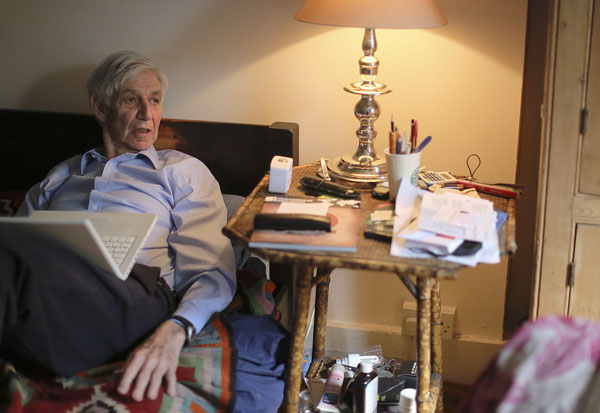
Roula Khalaf, Editor of the FT, selects her favourite stories in this weekly newsletter.
Eight years have passed since the developmental biologist Lewis Wolpert retired from his teaching post at University College London but, at the age of 83, he is emeritus professor of biology at UCL and vice-president of the British Humanist Association, writes books and, until a hip operation several months ago, regularly cycled, ran and played tennis.
“This place is pretty chaotic,” Wolpert says, settling into a deep leather armchair in his garden flat in Belsize Park, north London, and gently placing his spectacles on a coffee table.
Outside, the garden lawn waves with long grass and there is not a flower in sight. Inside, rooms are scattered with objects and curios. Works by Rhodesian-born artist Yolanda Sonnabend and Scottish printmaker Robert Colquhoun decorate the walls, alongside watercolours and prints bought during Wolpert’s travels abroad. It feels more like an artist’s house than a scientist’s but the interiors are misleading.
“I would like the public to understand that science is the best way to understand the world,” Wolpert says. Among colleagues, the South African-born scientist is acclaimed for his ideas on pattern formation in the embryo and “positional information”, by which cells recognise where they ought to be within the field of a developing organ. But he is better known for making evolutionary thought more accessible to a wider audience.
More broadly, Wolpert is both a polymath and public figure, offering his views on everything from religion and depression to old age and philosophy. He first captured the public’s attention with his 1999 book Malignant Sadness, which examines the causes of clinical depression and the comparative merits of drugs and psychotherapy, made more real by very personal sections on his own experience with the illness.
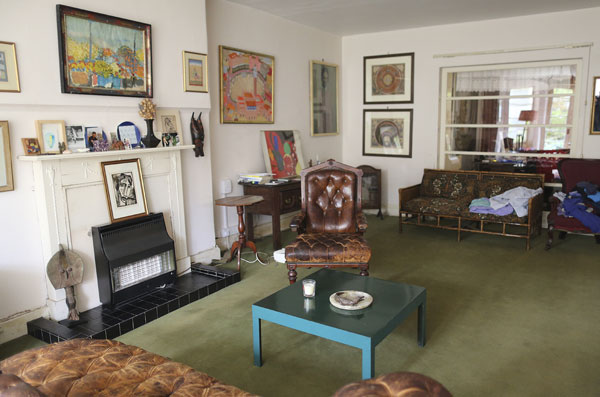
It was while living in this flat with his late wife, Australian writer and critic Jill Neville, that Wolpert began suffering from chronic depression. “It wasn’t loss of happiness because I was perfectly happy. I was living here with Jill and I was a professor at UCL. Everything was absolutely fine.” But after a night of feeling intense suicidal urges, he checked himself into the Royal Free Hospital in London.
“I had a very good psychiatrist . . . I also had cognitive behavioural therapy which I found very helpful. To this day, I have not the foggiest notion as to why I went into a depression, and the tragedy was Jill said to me: ‘If you’re not better in a year, I’ll help you die’ – and a year later she died of cancer.”
Wolpert recalls the time when he and Jill, who was his second wife, first moved into the three-bedroom property more than 30 years ago. “We had good times in this house. It’s lovely living in the area and I enjoy going for runs on Primrose Hill. We’ve also had many nice parties. I had an excellent 80th birthday party here.”
In his most recent book, You’re Looking Very Well: The Surprising Nature of Getting Old (2012), Wolpert presents research arguing that happiness peaks at the age of 74. “It’s a nice age because any major problems you might have would have already been solved by then. As for myself, I can’t say that I was particularly happy at that stage being just on the brink of retirement, but that’s what the evidence suggests.”
Inspired by Anthony Trollope’s idea in The Fixed Period (1882), in which a colony near New Zealand has to tackle an ageing population, Wolpert suggests, not entirely seriously, that we should all possess a gene that ensures a painless death once we reach 85. He also argues that elderly sufferers of terminal illness should be allowed assisted suicide. “When we’re old and have an incurable disease, for which there is no hope for recovery, we have absolutely the right to have a peaceful death.”
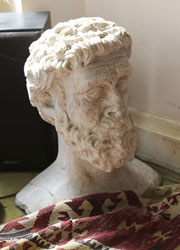
Wolpert limps slightly as he walks to his bedroom. Lived in and well-worn, this room is where most of his writing is done. Biology and psychology books and notes are strewn all over his bed, with only a little space left for him to lie down. On the walls hang more artworks, including originals by his friend Dick Findlay, purchased in Pretoria.
Wolpert was born into a conservative Jewish household in Johannesburg. His family, while not strictly religious, was decidedly Jewish culturally; Wolpert took Hebrew lessons, had a bar mitzvah, went to the synagogue every Saturday – and even lived in Israel for a year – but aged 16 turned away from the faith. “My mother wanted a nice Jewish son. And that just wasn’t me,” he says.
Now he considers himself to be a secular humanist. In Six Impossible Things Before Breakfast, his 2006 book investigating the nature of belief and its causes, he ponders the origins of religion. “I argue that religion comes from toolmaking, discovered by human beings thousands of years ago. Toolmaking requires that you have an understanding of physical cause and effect. Now, once we evolved a concept of physical causes and effects, we look for causes of other things that affected our lives. The one causal basis that we know is that humans are causal – and that, I believe, is the origin of God.”
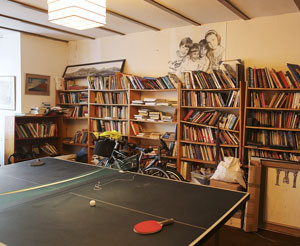
As an atheist, can he see any benefits to religious faith? “Religion, in a way, helps people a great deal because it promotes optimism and hope. You believe that you can get help from God by praying and this makes you feel much better. On the whole, and specifically from a health point of view, I think religious people do better than those who don’t believe. It is only when religion starts interfering with how other people should live by pushing its own ideas that I’m very much against it.”
Wolpert once used the third bedroom in his home as a study but it now serves as his library. A large table tennis table stands in the middle of the room, with bookshelves lined against the walls. He still plays table tennis every now and then but tennis is his real love. “That’s a lovely photograph of my kids,” he says, pointing to a huge portrait of his children. “Four children under five [years old], well at least at that time,” he smiles.
Wolpert, who also has six grandchildren, lives on his own, but stays fairly often at his partner Alison’s house, just round the corner from his flat. “I spend the night at hers, and after breakfast, I come home,” he says.
He is working on a book exploring the evolution of sex and gender in humans, to be published later this year. He explains that the brains of men and women are largely similar but their relative differences influence specific behaviour in each.
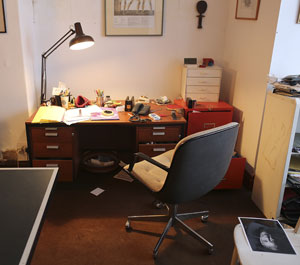
“One of the features that the brain affects is empathy. Women are hard-wired for empathy and the reason for this is that one of their main evolutionary functions is to look after children. Males of course can help with looking after the children, but, as psychology professor Simon Baron-Cohen has pointed out, they are by nature systemisers.”
So what is the difference between an empathetic brain and a systemising one? “An empathising brain is very involved in other people’s emotions and the ability to decode non-verbal emotional cues. The systemiser, on the other hand, is interested in solving problems, trying to find out how things work.” Wolpert believes these distinctions explain the key differences in the subjects men and women find interesting.
As the interview draws to a close we stand and survey the garden. “My mother and my first wife were gardeners,” he says. “And as you can see, I’m not a gardener – but I do sit in the garden sometimes.”
——————————————-
Favourite things

Wolpert chooses three objects, the first of which is a mystery bust. “I bought this in Spain about 25 years ago,” he says. “I don’t have the foggiest notion whose head it is but apparently it’s quite old.” His second favourite thing is an object with sentimental value. “This is a crocodile ashtray I took from my parents’ house in Johannesburg and brought with me to London when I moved here in 1954. I didn’t bring many things with me from home; just a few and this was one of those.” The last object is a painting. “I’m rather fond of this painting by a character called Robert Colquhoun. I was in Soho quite a lot in the 1950s. One day, he came up to me and said, ‘I need some money. You can buy this for £20.’ Of course, I bought it. It takes me back to the time I was in Soho a lot.”
——————————————-
Letter in response to this article:
Tolstoy was right about life and love / From Mr William Galle
Comments